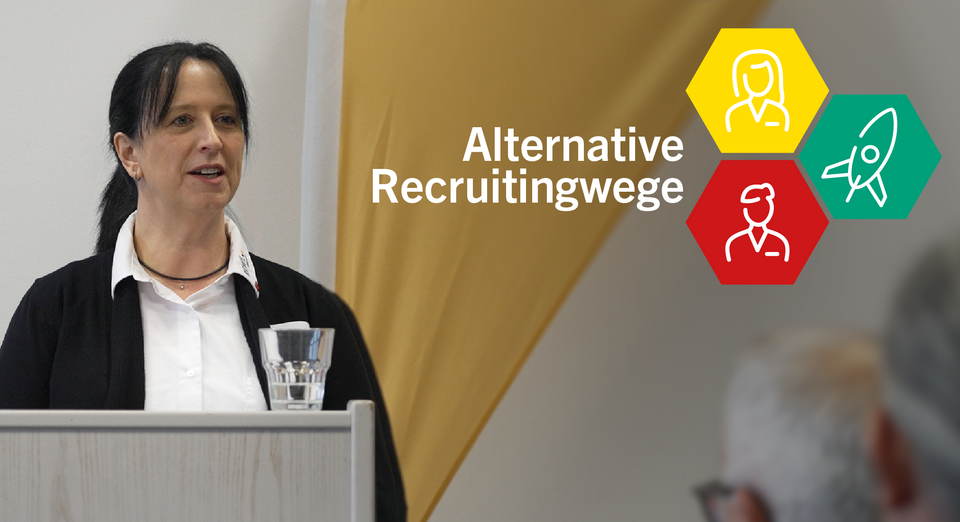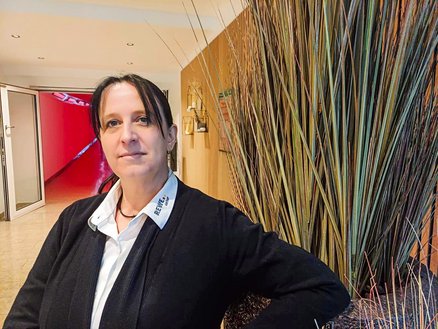
Antje Brückner accompanied the partial qualification programme as a representative of the works council. Here she explains why she was enthusiastic about the project, where the works council can support participants and store managers and what tips she has for interested "imitators".
one: Mrs Brückner, why and how did you support the partial qualification (TQ) project as a works council member?
Antje Brückner: We on Works Council South 1 look after the REWE and PENNY stores in the southern region. When Dirk Hoffmann and Mandy Hintermeier presented the project to our 40-strong Works Council committee, I thought it was great and thought: 'Everyone wins'. Because everyone has their own story and should be given a chance to build a life here. I saw this opportunity in the project. After the TQ presentation, I contacted Dirk Hoffmann and he asked me if I would like to be involved as a works council representative. I was therefore able to accompany the participants right from the start. Now they have all received their employment contracts and are allowed to gain experience in the stores. When I see the participants now and compare them with the first meeting, I can see how much they have grown together into a great group.
Of course, Dirk Hoffmann and Mandy Hintermeier do the main work with the TQ. However, the presence of a works council member made it clear to the participants from day one that the works council also supports the recruitment of skilled workers. In the first few weeks at the store, the participants will now also get to know their respective works council. This creates trust and shows that there is an employee representative in the company to whom they can turn with questions and concerns.
one: What worries and concerns might be brought to you and your works council colleagues?
Antje Brückner : The project participants have their reasons for leaving or not joining the labour market: Flight from a war zone, language barriers, divorce, childcare, etc. Of course, not everyone wants to talk about it.but we works councils can hold confidential discussions to provide information about the programmes offered by the company. I'm thinking in particular of the opportunity to contact our LoS! multipliers. These are specially trained colleagues with an open ear, helpful tips and addresses on topics such as separation, caring for relatives, domestic violence or financial problems, to name just a few. Many of our employees and works councils have undergone training to become LoS! multipliers. They are all available to all of our employees without exception.
one: In your opinion, what experiences were particularly valuable that you would like to share with other works councils, managers and participants?
Antje Brückner: A valuable experience for me was and is being there and realising how much work the organisers, Dirk Hoffmann and Mandy Hintermeier, put into the preparation and implementation. Anyone who wants to start a partial qualification in their region, whether senior managers or works councils, is in very good hands with this recruiting team. Beforehand, I would recommend inviting both of them to a works council meeting to present the project.
From my experience, I know that many questions that line managers have in advance will be answered if a works council is part of the project team. The partial qualification is a contribution that we can use to counteract the shortage of skilled labour in the future. And I'm already looking forward to meeting the project participants in the stores.
 Antje Brückner is a member of Works Council South 1. The trained construction machinery maintenance mechanic worked for 16 years as a career changer in a REWE store in Munich city centre. Since 2022, she has been a full-time works council member for a total of 40 REWE and PENNY stores in Munich. Her experience with culturally and linguistically "colourful teams" has taught her that "a face-to-face meeting on site can often achieve more than a phone call."
Antje Brückner is a member of Works Council South 1. The trained construction machinery maintenance mechanic worked for 16 years as a career changer in a REWE store in Munich city centre. Since 2022, she has been a full-time works council member for a total of 40 REWE and PENNY stores in Munich. Her experience with culturally and linguistically "colourful teams" has taught her that "a face-to-face meeting on site can often achieve more than a phone call."
Back to working life
The shortage of skilled labour is reflected in falling numbers of applicants. At the same time, there are around 1.5 million people who are unemployed and low-skilled, i.e. who have not completed vocational training. This is precisely where the Recruiting Centre's pilot project comes in: Together with the Federal Employment Agency, local job centres and educational partners, long-term unemployed and low-skilled workers are being trained for sales jobs in REWE and PENNY stores as part of a partial qualification (TQ).
We wanted to know from the participants how the project has helped them get back into work. We asked retailers, district managers, store managers and HR partners how it is helping them locally to combat the shortage of skilled labour. Employees from the Federal Employment Agency and training providers explain how they support the project.













